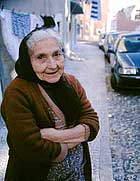Usually, the trauma remains just beneath the surface. But every once in a while events conspire to bring it all back to the fore. Take, for example, the intense international focus paid to Rom Houben. In 1983, Houben suffered catastrophic head injuries in an automobile accident. He was brought to the hospital unconscious. Doctors eventually concluded that his case was hopeless, that he was in a persistent vegetative state.
The PVS diagnosis meant that on the day Terri died, most bioethicists would have also approved Rom being dehydrated to death. He is no longer a “person,” they might have said., Why prolong a useless life?
Indeed, removing food and water from the profoundly cognitively impaired, has, over the last twenty years, been legalized in all fifty states and declared by bioethicists and judges to be fully ethical, indeed, just a matter of “death with dignity.” This, even though repeated studies have shown that about 40% of PVS diagnoses are mistaken.
One of those misdiagnoses, it turned out, was of Rom Houben.
Unlike Terri, he is alive today and—literally—telling his tale because he didn't have a spouse dedicated to making sure he died, nor a judge refusing his family’s every entreaty to try new brain tests. Indeed, his family eventually prevailed upon internationally renowned physician Dr. Steven Laureys to perform a PET scan of Rom’s brain—not available at the time of the initial diagnosis—which revealed startlingly that his brain activity was near normal.
Further studies revealed that Rom Houbens was actually fully awake and aware but unable to communicate, a condition known as the “locked-in state,”
Therapy commenced and soon Rom was communicating in a rudimentary way by answering yes or no questions with the movement of a foot. Patiently over three years, his abilities improved. Rom now communicates with the help of a speech therapist—who moves his finger over a computer keyboard, allowing him to contract his finger to type each letter.
He is now telling his story of years of terrible frustration and loneliness during the 23 years he was isolated by his inability to communicate—and then great joy of reconnecting with the world, an event he calls his “second birth.”
The news about Rom’s marked improvement has been surprisingly controversial. Some critics have groused that his interactivity is actually a “facilitated communication” scam, in which the actual communicator is the therapist rather than the patient. But that seems unlikely.
Dr. Laureys is internationally renowned, and in an interview in the New Scientist, he denied participating in such a subterfuge. A story in the Associated Press provided details casting doubt on the facilitated communication criticism:
One of the checks Laureys applied to verify Houben was really communicating was to send the speech therapist away before showing his patient different objects. When the aide came back and Houben was asked to say what he saw, that same hand held by the aide punched in the right information, he said.
Meanwhile, as people marveled at Rom’s turn in fortune, Terri Schiavo quickly became the subtext of the story. While no one contended she was also locked-in (her autopsy stated that the condition of her brain was consistent with either PVS or minimal consciousness), activists on both sides of the ethical debate over dehydrating patients weighed in about how to best care (or not care) for such patients.
Noted bioethicist, Art Caplan, who strongly backed Michael Schaivo’s quest to end his wife’s life, assured people that it is proper to remove sustenance from the profoundly impaired whether or not they are actually unconscious.
Meanwhile, the Huffington Post’s resident bioethicist, Jacob Appel, argued that patients such as Rom should be considered for euthanasia: “Rather than offering a compelling reason to keep such patients alive,” Appel wrote, “the horrors of enduring such a petrified existence may offer a compelling reason to let them die.”
In contrast, the Calgary Herald spoke just as strongly when it editorialized, “The lesson from Houben's case--and reinforced, sadly, too late by Schiavo's case-- is that if doctors and courts must err, it should always be on the side of life, and on the assumption that despite all outward appearances, the "I" is "indeed there."
Others in the media also made the Schiavo connection. Time, for example, reported that Schiavo-type “legal fights are likely to become more common as classifications of brain-injury severity are revised.” ABC reported that Terri Schiavo’s family “felt heartbreak and vindication” about the story.
So Terri Schiavo remains very much with us. Polls show that most people believe that her dehydration was just and proper because she was so impaired. But perhaps our inner voice, the part of us that never lies, sees it differently. Perhaps the reason Terri Schiavo comes so quickly to mind whenever we hear stories about “miraculous” awakenings, is that we remain profoundly disturbed by what we did to her, haunted it would seem, by her beautifully smiling face.
 Terri Schiavo continues to prick our collective conscience, our sensitivity to the way she died -- deprived of all food and water, even the balm of ice chips for nearly two weeks -- as raw today as on the day she drew her last breath five years ago next March.
Terri Schiavo continues to prick our collective conscience, our sensitivity to the way she died -- deprived of all food and water, even the balm of ice chips for nearly two weeks -- as raw today as on the day she drew her last breath five years ago next March. 





 "Medical advances caught up with him," said Dr Laureys, who believes there may be many similar cases of false comas around the world. The disclosure will also renew the right-to-die debate over whether people in comas are truly unconscious. Mr Houben, a former martial arts enthusiast, was paralysed in 1983.
"Medical advances caught up with him," said Dr Laureys, who believes there may be many similar cases of false comas around the world. The disclosure will also renew the right-to-die debate over whether people in comas are truly unconscious. Mr Houben, a former martial arts enthusiast, was paralysed in 1983. 
